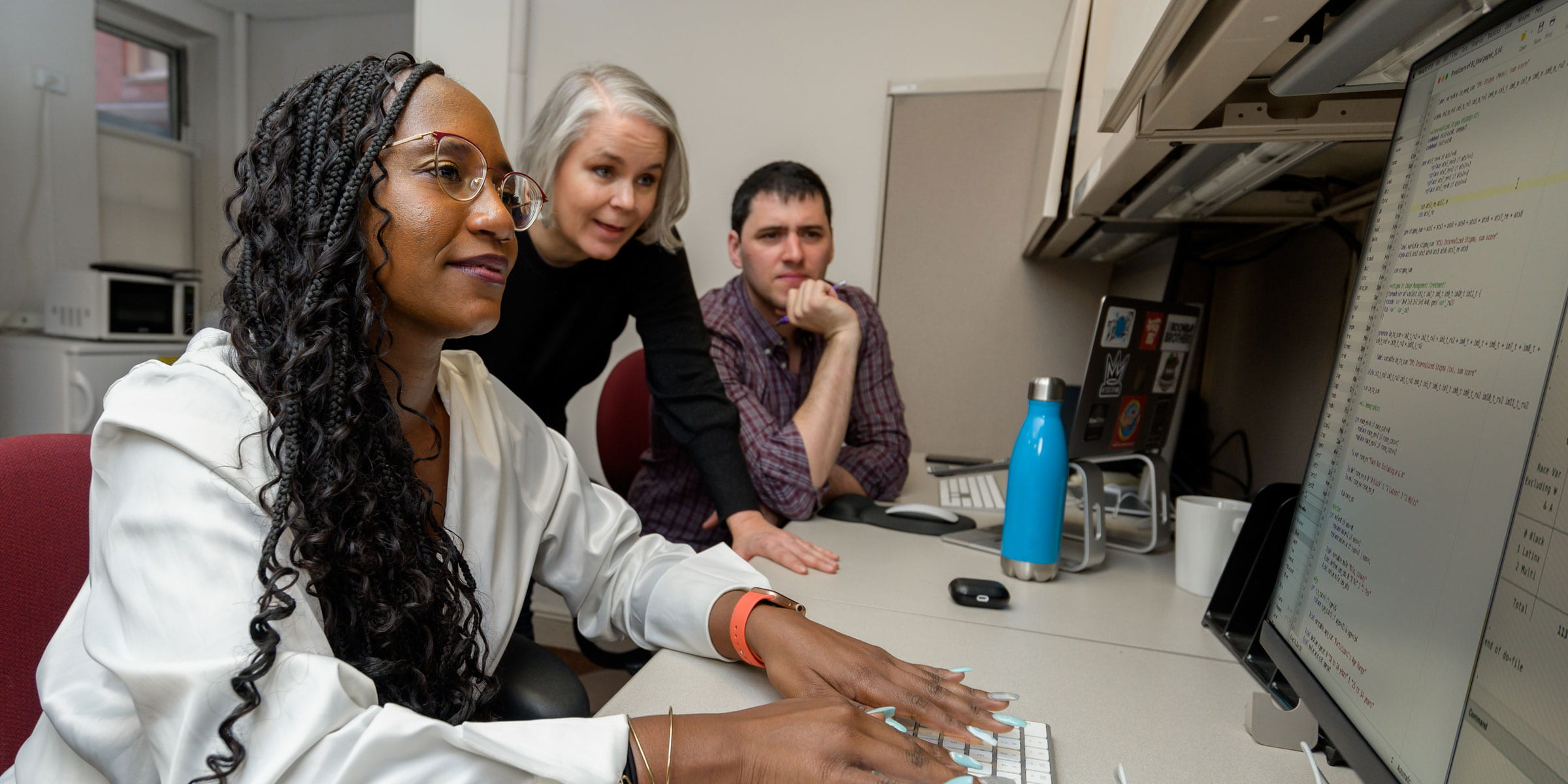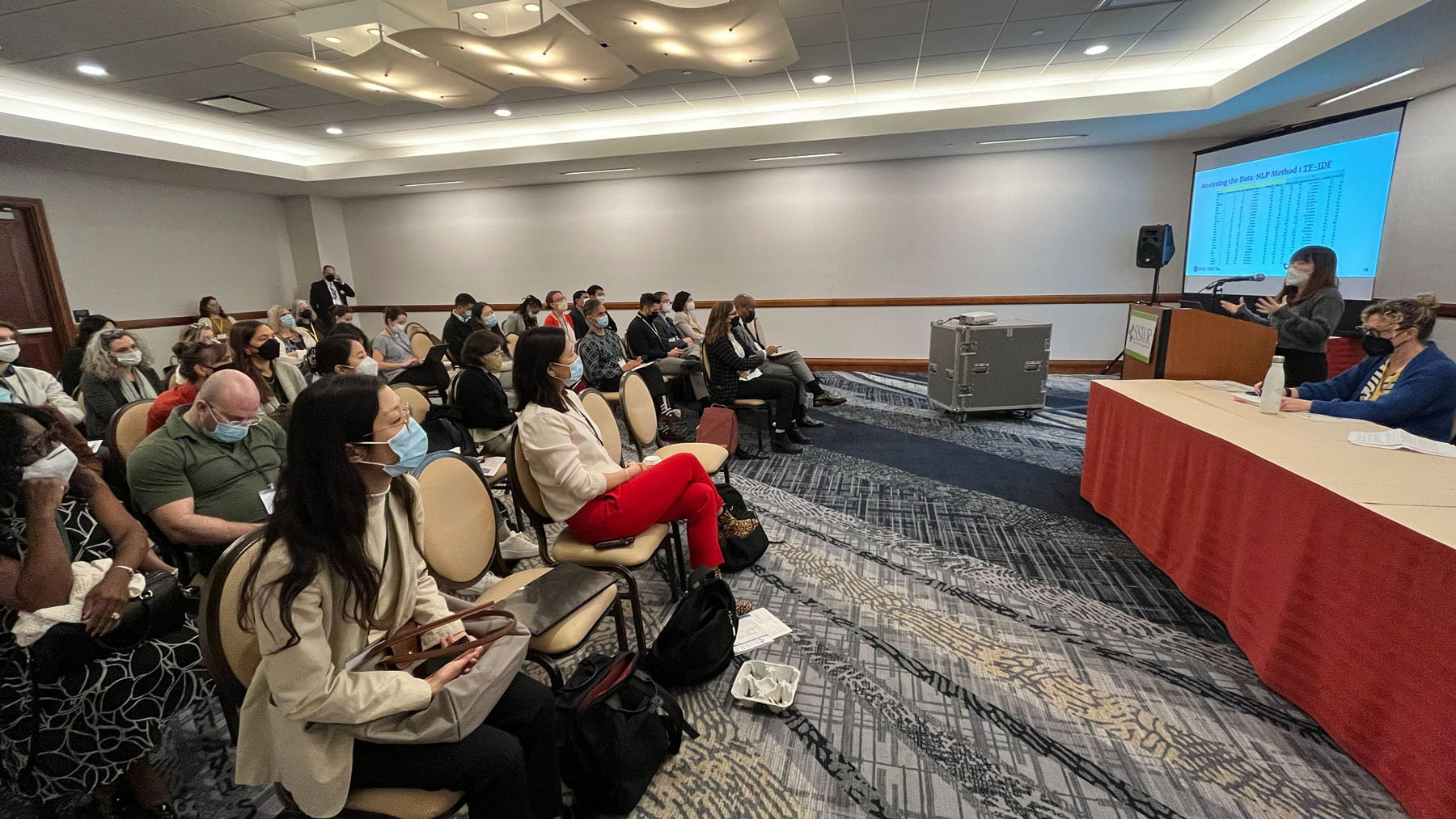
The Future of Social Work at NYU Silver

Artificial intelligence and other advanced tools are rapidly reshaping many aspects of human life. In social work, they present opportunities to improve the quality of care that people receive, better identify risk factors and address health disparities.
Thanks to a transformational gift from Dr. Constance Silver and Martin Silver, our School is moving the profession forward in how we harness artificial intelligence, data science and simulation tools to improve practicum education, conduct innovative research and develop life-changing interventions. We are also leading important conversations about how these technologies can be used in ways that advance equity, instead of perpetuating it.
These are just some of the ways in which our faculty and students are incorporating these technologies into social work education and research:
- Associate Professor Doris Chang is leading sentiment analysis of geocoded Twitter data of anti-Asian and anti-Black bias, as well as solidarity and allyship across racial groups. In related work, PhD candidate Nari Yoo led a study finding that Republican-majority and swing states showed indications of greater stereotyping of Asian-born and Asian Americans, with European Americans more likely to see them as foreign.
- James Weldon Johnson Professor of Social Work, MSW Program Director, and Director of the Center for Health and Aging Innovation Ernest Gonzales is leading a comparison of machine learning AI methods to traditional statistical methods to predict cognitive functioning in later life.
- Paulette Goddard Professor and Dean Emeritus Neil Guterman is leading the application of a highly innovative language analysis technology guided by AI to analyze over 3,000 hours of parent-child interactions to help predict risks of child abuse and neglect.
- Technology-based simulations are increasingly being used to train students in practice-related skills, as agency-based practicum becomes more restrictive, and new research shows the benefits of social work education simulation for students. Clinical Associate Professor Nicholas Lanzieri and Clinical Associate Professor and Interim Assistant Dean of Practicum Education & Community Partnerships Anne Dempsey are developing and will pilot test an AI-powered, technology-based simulation template for MSW students in collaboration with faculty from the NYU Tandon School of Engineering and NYU Steinhardt School of Culture, Education, and Human Development.
- Dr. Lanzieri has also studied the feasibility of a virtual reality system that immerses students in the home of a client with whom they interact in the virtual environment.
- Dean Michael A. Lindsey is leading the development of forecasting tools utilizing machine learning to identify risk of adolescent suicide and explore potential biases within algorithms related to race/ethnicity.
- Professor Michelle Munson is leading the development of machine learning methods to harness ‘big data’ from administrative datasets to identify and address unmet mental health needs among disadvantaged young adults.
- Professor Victoria Stanhope is engaged in a supervised approach to unstructured data analysis using natural language processing, leading to an AI algorithm to detect person-centered care from mental health clinical visit notes in order to help improve the quality of behavioral health care.
- DSW student Carmen Villavicencio-Hein, is embedding artificial intelligence as an experiential learning tool in a new MSW-level course she developed on social work practice in urban school settings.
 Meanwhile, our Constance and Martin Silver Center on Data Science and Social Equity (C+M Silver Center) and AI Hub at McSilver are doing groundbreaking work to fund and present innovative research, educate and lead critical conversations.
Meanwhile, our Constance and Martin Silver Center on Data Science and Social Equity (C+M Silver Center) and AI Hub at McSilver are doing groundbreaking work to fund and present innovative research, educate and lead critical conversations.
- At the 2023 Society for Social Work Research conference, the C+M Silver Center held a standing-room-only symposium, organized by C+M Silver Center Director of Operations Amanda Ritchie. In Summer 2023 the C+M Center hosted the Summer Institute in Computational Social Science, which brought together graduate students, postdoctoral researchers and early-career faculty from social work and other disciplines to promote collaboration and research on computational social science for social good.
- In the Fall of 2022, the AI Hub at the McSilver Institute for Poverty Policy and Research, which is led by Executive Director Rosemonde Pierre-Louis, hosted Dr. Timnit Gebru, founder and executive director of the Distributed Artificial Intelligence Research Institute. She gave an illuminating, virtual discussion about how the algorithms that affect our daily lives can place disproportionate harm on BIPOC and other marginalized people, as well as ways they can be used to repair harm.